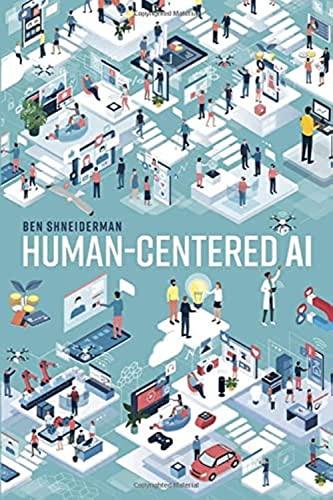instructor Hood's Key Ideas from Human-Centered AI
by Ben Shneiderman
Ideas, facts & insights covering these topics:
14 ideas
·2.33K reads
18
Explore the World's Best Ideas
Join today and uncover 100+ curated journeys from 50+ topics. Unlock access to our mobile app with extensive features.
Human-Centered AI
- Human-Centered AI (HCAI) seeks to empower people, not replace them.
- HCAI vests in rationalism and empiricism.
- HCAI attempts to combine significant levels of human control with automation.
- HCAI strives to be “reliable, safe and trustworthy.”
- HCAI designs should be consistent and user-friendly, and should prioritize user control.
- AI research should focus on science and innovation.
- Software engineers who create HCAI systems should use ethically viable practices.
- Businesses deploying HCAI systems must prepare for potential failures.
- As AI develops, organizations should adopt HCAI principles.
42
392 reads
Human-Centered AI (HCAI) seeks to empower people, not replace them
Artificial intelligence – gaining fuel from increasingly sophisticated algorithms, machine learning and deep learning – promises immense advances in medicine, manufacturing, communications and transportation. Yet criminals, terrorists and people seeking to undermine democracies and their institutions can also exploit possibilities that AI advances reveal.
“The remarkable progress in algorithms for machine and deep learning during the past decade has opened the doors to new opportunities, and some dark possibilities.”
37
272 reads
HCAI provides strategies for moving away from AI that focuses exclusively on powerful algorithms, and toward AI that prioritizes the human perspective. In the past, AI researchers and developers targeted the power and performance of algorithms and technologies. But fear of bad actors and AI’s impact on the economy made people increasingly concerned over AI’s effects on humans. HCAI doesn’t want AI and automation to replace human beings. It aspires to keep people in control of AI. It wants AI to benefit human beings and promote human aspirations.
35
197 reads
HCAI vests in rationalism and empiricism
In the Western philosophical tradition, rationalism and empiricism contrast with one another. Rationalists such as René Descartes developed their worldview through introspection, reason, logic and mathematics. Without ever leaving their desks, and with their faith in the methodologies at their disposal, rationalists sought the absolute truth. Empiricists such as John Locke and David Hume, conversely, insisted that they had to leave their desks and observe the world in all its complexity to find the truth.
34
184 reads
Moving forward, technology design’s character will depend upon whether researchers and developers are rationalists or empiricists. AI rationalists lean toward “autonomous designs” that allow AI to operate without human intervention. But the prospect of, for example, military use of “lethal autonomous weapons systems” and safety issues surrounding self-driving cars led designers to increasingly adopt an empiricist approach. AI’s systematic biases that arise in the criminal justice and mortgage approval systems have led people to seek a more concrete understanding of how these systems work.
33
152 reads
HCAI attempts to combine significant levels of human control with automation
HCAI distinguishes the degree to which AI is autonomous and supports automation, and the degree to which people control AI. HCAI seeks AI systems that combine autonomy and human control. This combination of human control and autonomy should promote applications that are “reliable, safe, and trustworthy” and that enhance human performance in complex projects.
“There is growing awareness by leading artificial intelligence researchers and developers that human-centered designs are needed.”
35
144 reads
HCAI strives to be reliable, safe and trustworthy
Researchers and developers find machine autonomy appealing. But human autonomy is equally significant. As separate goals, machine and human autonomy can be useful and valuable in certain contexts, but function improves when they work in combination. Apply AI-driven machine autonomy in stable and consistent contexts, and human autonomy when AI-driven machine autonomy proves inadequate.
“Software engineers, business managers, independent oversight committees and government regulators all care about the three goals.”
34
122 reads
HCAI designs should be consistent and user-friendly, and should prioritize user control
The debate over whether to pursue artificial intelligence or “intelligence augmentation” is more or less irrelevant. Builders can design HCAI systems in ways that combine AI algorithms with interfaces that increase human capabilities.
“Successful designs are comprehensible, predictable and controllable, thereby increasing the users’ self-efficacy.”
33
119 reads
AI research should focus on science and innovation
“Bold aspirations can be helpful, but another line of criticism is that the AI science methods have failed, giving way to more traditional solutions, which have succeeded.”
33
119 reads
Software engineers who create HCAI systems should use ethically viable practices
HCAI may provide benefits for humans in health care, education, criminal justice and the environment. HCAI could improve medical diagnoses and provide ways to protect species at risk of extinction. Some fear the misuse of AI capabilities to persecute minority groups, violate human rights and commit crimes. HCAI’s core aspiration is to empower and benefit humans while incorporating ways to mitigate its own misuse.
“HCAI research builds on these scientific foundations by using them to amplify, augment and enhance human performance in ways that make systems reliable, safe and trustworthy.”
33
105 reads
Businesses deploying HCAI systems must prepare for potential failures
People, organizations and systems all fail sometimes. But users can mitigate against failure and deal with it. In the past, the consequences of such failures rose within fairly well-defined boundaries. In a globalized world that has a dependence upon digital technologies, failures can foment catastrophic, widespread consequences.
“Preparing for failure by organizational design has become a major HCAI theme.”
34
109 reads
Organizations can take responsibility for an accident or failure. This requires clear operating procedures and a well-defined chain of command. Organizations can approach failure through the prism of the organization’s design and management. Such an organization pays rigorous attention to possible and near-failures, and how to avoid and mitigate them. An organization can address potential failure through “resilience engineering,” which leads an organization to become agile enough to successfully respond to even unanticipated failures.
35
111 reads
As AI develops, organizations should adopt HCAI principles
AI is advancing rapidly, with ever-more-powerful systems and applications.
“This means gathering user requirements, adherence to design guidelines, iterative testing with users, and continuous evaluation once the product or service is released.”
33
130 reads
IDEAS CURATED BY
CURATOR'S NOTE
Human-Centered AI (HCAI) provides strategies for grounding AI in human values and deploying this powerful new technology to improve, not diminish, people’s lives.
“
Different Perspectives Curated by Others from Human-Centered AI
Curious about different takes? Check out our book page to explore multiple unique summaries written by Deepstash curators:
4 ideas
Adell Falah's Key Ideas from Human-Centered AI
Ben Shneiderman
Discover Key Ideas from Books on Similar Topics
13 ideas
Life 3.0
Max Tegmark
10 ideas
Scrum
Jeff Sutherland, J.J. Sutherland
9 ideas
Change from the Inside Out
Erika Andersen
Read & Learn
20x Faster
without
deepstash
with
deepstash
with
deepstash
Personalized microlearning
—
100+ Learning Journeys
—
Access to 200,000+ ideas
—
Access to the mobile app
—
Unlimited idea saving
—
—
Unlimited history
—
—
Unlimited listening to ideas
—
—
Downloading & offline access
—
—
Supercharge your mind with one idea per day
Enter your email and spend 1 minute every day to learn something new.
I agree to receive email updates

